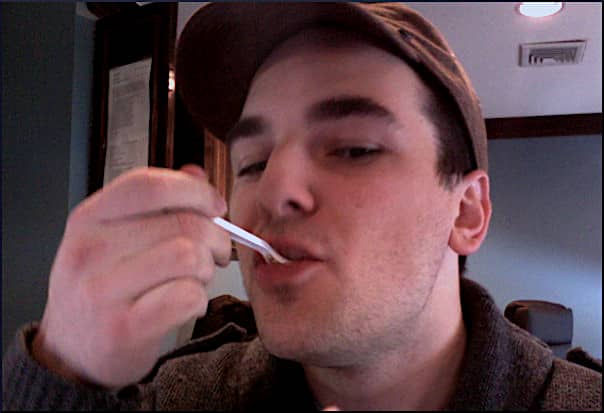
People today do a lot of recreational eating. Usually, what they are eating simply tastes too good to stop. Dr. Pretlow says,
Eating primarily for pleasure, rather than nutrition, is the great American pastime. I certainly don’t mean to condemn pleasurable foods, but in some individuals even everyday cooking, if laden with sugar, salt, and fat, can become a problem. Using everyday cooking for a “flavor rush” may still be using food to cope. In a segment of the population, this may result in dependence on those foods and inability to control the eating.
All sensations including taste reside in the brain. A lot of what we “know” about the subject comes from mice studies, although parallel human studies have not had clear results. Taste can be studied on a cellular level in mice by manipulating their genes to omit certain taste receptor cells. But while their subsequent behavior can be observed, these experimental subjects cannot be interviewed about their subjective perceptions.
The mechanisms of taste did not evolve for pleasure alone, but to detect chemicals in the environment, with the object of avoiding the harmful ones. Taste receptors are not exclusive to the mouth:
Bitter receptors (T2Rs) are found on the cilia and smooth muscle cells of the trachea and bronchi where they probably serve to expel inhaled irritants. Sweet receptors (T1Rs) are found in cells of the duodenum. When sugars reach the duodenum, the cells respond by releasing incretins. These cause the beta cells of the pancreas to increase the release of insulin.
Like everything else, it’s about survival. Eat this and die; eat that and live — to hunt and gather for another day.
Multifactorialism strikes again
There used to be only four identified basic tastes — sweet, sour, salty, and bitter. A previous post covered umami, the widely-acclaimed fifth taste. (As it turns out, there might be as many as 14.) But here is something new: the key to umami is more than MSG. It takes a couple of other substances too:
There is a synergistic effect between MSG, IMP and GMP which together in certain ratios produce a strong umami taste.
Also, as it turns out, umami tastes awful on its own.
In a post about hyperpalatable foods, we quoted Steven A. Witherly, Ph.D., who has expressed the idea that sugar acts on obese people much like an opiate acts on an addict. As time goes by, the person requires a larger dose to get any effect. This is called tolerance, and it is a trademark of addiction.
The following interesting information comes from an uncredited author at ScienceOfCooking.com:
At least two different variants of the “sweetness receptors” need to be activated for the brain to register sweetness. The compounds which the brain senses as sweet are thus compounds that can bind with varying bond strength to several different sweetness receptors.
(To be continued…)
Your responses and feedback are welcome!
Source: “The Sense of Taste,” Biology-Pages.info, 03/08/18
Source: “About the Five Basic Tastes,” ScienceOfCooking.com
Photo credit: Michael Galpert on Visualhunt/CC BY

 FAQs and Media Requests:
FAQs and Media Requests: 












One Response
i am so much intrested thanks for intresting information quite knowledge full